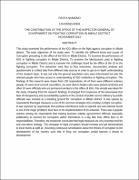The contribution of the office of the inspector general of government on fighting corruption in Mbale district.
Abstract
ABSTRACT
This study examined the performance of the IGG office on the fight against corruption in Mbale district. The main objectives of the study were: To identify the different kinds and causes of Corruption prevailing in the office of the IGG in Mbale District, To examine the performance of IGG in fighting corruption in Mbale District, To examine the Mechanisms used in fighting corruption in Mbale District and to examine the challenges faced by the office of the IG in the fighting corruption. The researcher used face to face interviews, documentary analysis and questionnaire to collect data from different data sources in order to get an in depth understanding of the research topic. It was not only the general population who were interviewed but also the selected people who have access to understanding of IGG institution in fighting corruption. The findings of this research were drawn from 130 respondents, 64 of them were different ordinary people, 50 were local council councillors, six were district leaders who were picked randomly and other 10 were officials who are permanent workers in the office of IGG, this sample was taken for the study. Drawing from the research findings, it emerged from responses of the interviewee that lack of transparency and accountability systems in the conduct of public service delivery by public officials was stressed as a breeding ground for corruption in Mbale district. It was opined by respondents that legal measures is one of the common strategies IGG employs to fight corruption. It was reported by respondents that political interference both at national and sub-national levels is one of the major problems IGG face in the implementation of its activities. There was a popular opinion among the respondents that making business entities (government officials especially politicians) to account for corruption within themselves is a big task IGG office face in its responsibilities. Therefore, the researcher concluded that legal measures are very essential tool for anti-corruption strategy. The campaign to fight corruption should increase and get decentralized to local levels as well as; mounting continuous sensitisation about the threats of corruption to the development of the country such that in long run corruption would become a dream to development.
Collections
- Thesis and Dissertations [126]

